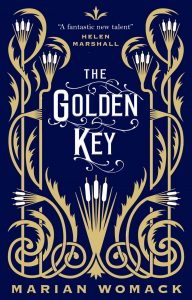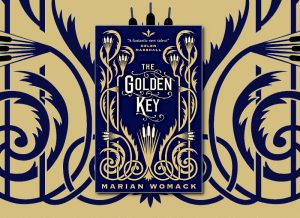THE GOLDEN KEY by Marian Womack (Book Review)
‘But then, it is not that simple, is it, Miss Walton? What is the truth?’
‘What do you mean? The truth is the truth.’
‘Really? What we count as reality might simply not be there in the first place. Different people tell stories in different ways; family stories are usually reshaped to conform to the rules of society – And the stories we tell our children – ‘ she laughed sadly. ‘How can we feed them all that rubbish, fairyland and all that?’”
“Eliza thought she understood that this countryside was haunted, by the bitterness, by the sorrow, by the suffering that went into its making. The same men who were forced to drain it lost their way of life, while they did it. They had not benefited from the change. No one had given them a piece of land to grow crops and feed their families. Was it possible that the land itself was furious, as those men might have been?”
Last year I was blown away by Marian Womack’s debut short story collection Lost Objects (2018). This year sees the publication of Womack’s debut English novel The Golden Key (2020), which more than lives up to the lofty promise of the previous collection. It is a bold, ambitious and genre-bending novel, one that isn’t afraid to assume a sensitive and intelligent reader. The Golden Key covers a lot of ground, from the George MacDonald fairy tale quoted at the beginning which gives the book its name, to the Victorian fascination with mediums and Spiritualism, to slow-burning gothic to folk horror to environmentalism and the destructive arrogance of imperialism. The end result is a smart, haunting novel that stuns the reader with its elegance and beauty but refuses to leave their mind after reading. Although the year has only just begun, if I read another novel as good as this in 2020 I will be doing well.
 The Golden Key is set in England in 1901, directly after the death of Queen Victoria, and tells the story of Helena Walton-Ciscneros, a medium and detective, as she tries to solve the mystery of the disappearance of Lady Matthews’s stepchildren twenty years previously. Now children are disappearing again, and women are appearing in the marshes struck down with catatonia. The course of her investigations, between London and the mystery-shrouded Norfolk fens where the children vanished, keep bringing her back to Samuel Moncrieff, recently moved to London following personal tragedy, who is more involved in the strange happenings than he knows. The Golden Key is in part a historical mystery novel with strong flourishes of the gothic. Womack brilliantly captures the mood of London after Victoria’s death, which allows her to explore Victorian culture’s attitudes towards death and mortality. The novel explores the conflict between scientific rationalism and the pervasive interest in Spiritualism, mediums and the supernatural that characterised the time. Helena is directly situated in the overlap between the two. She is a rationalist and a scientist who has discovered that the ingrained sexism of patriarchal Victorian society means people more easily believe that her ability to solve mysteries comes from mystical powers than astute observation. Thus she is able to see how the sexism of the male-dominated Spiritualist research community and scientific communities, as well as how the colonialist drive to control, order and subjugate that which is studied biases them both. This is reflected in the character of Eliza, a young woman living in the Norfolk fens who assists Helena in her investigations, and her fascination with overlooked female American scientist Eunice Foote. Like Foote, a physicist who made the initial connection between carbon dioxide and climate change, and campaigned for women’s rights, Eliza and Helena face the obstacles of institutional sexism from men who are unable to appreciate their sharp rational minds, and allows men to take credit for Foote’s work.
The Golden Key is set in England in 1901, directly after the death of Queen Victoria, and tells the story of Helena Walton-Ciscneros, a medium and detective, as she tries to solve the mystery of the disappearance of Lady Matthews’s stepchildren twenty years previously. Now children are disappearing again, and women are appearing in the marshes struck down with catatonia. The course of her investigations, between London and the mystery-shrouded Norfolk fens where the children vanished, keep bringing her back to Samuel Moncrieff, recently moved to London following personal tragedy, who is more involved in the strange happenings than he knows. The Golden Key is in part a historical mystery novel with strong flourishes of the gothic. Womack brilliantly captures the mood of London after Victoria’s death, which allows her to explore Victorian culture’s attitudes towards death and mortality. The novel explores the conflict between scientific rationalism and the pervasive interest in Spiritualism, mediums and the supernatural that characterised the time. Helena is directly situated in the overlap between the two. She is a rationalist and a scientist who has discovered that the ingrained sexism of patriarchal Victorian society means people more easily believe that her ability to solve mysteries comes from mystical powers than astute observation. Thus she is able to see how the sexism of the male-dominated Spiritualist research community and scientific communities, as well as how the colonialist drive to control, order and subjugate that which is studied biases them both. This is reflected in the character of Eliza, a young woman living in the Norfolk fens who assists Helena in her investigations, and her fascination with overlooked female American scientist Eunice Foote. Like Foote, a physicist who made the initial connection between carbon dioxide and climate change, and campaigned for women’s rights, Eliza and Helena face the obstacles of institutional sexism from men who are unable to appreciate their sharp rational minds, and allows men to take credit for Foote’s work.
However, Helena soon finds her rationalism challenged by the encroaching supernatural as she is dragged deeper into the case. The Golden Key is also in part folk horror. The novel is steeped in the folklore of the Norfolk fens. The fens are liminal, situated between the land and the sea, somehow a part of both and neither. The haunting, brooding landscape, gorgeously described by Womack, gives the book much of its sense of mystery and fear. The people of the fens have strange stories of encounters with the devil, and the vanished children have a fascination with the fairyland depicted in George MacDonald’s Phantastes (1858) and The Princess and the Goblin (1872). The ruined Tudor manor hidden in the depths of the fens is covered with a strange, unfamiliar fungus. Soon Helena begins to suspect that the fens are a borderland between our world and another. Womack’s Norfolk fens, haunted by folklore and imprinted by the tragedies of those who have been displaced from the land, is almost a character in itself. Calling to mind the bleak and oppressive landscapes of Andrew Michael Hurley’s The Loney (2014), The Golden Key similarly manages to mine the history and the myths of a part of England to show us the familiar in a light we’ve never seen before.
The novel is also a surprisingly contemporary reflections of our anxieties around climate change. This is a theme that is clearly close to Womack’s heart from the short stories in Lost Objects. In The Golden Key, Womack draws parallels between the early years of capitalism and industry under the Victorians and the damage we are causing to the environment right now. Lady Matthews’s abandoned factory in the fens is leaking poison into the fens, destroying people’s livelihoods and the local wildlife in equal measure. Eliza and Helena both notice the odd lack of birds and insects, centuries-old migration patterns disrupted by pollution and changes in land use. By connecting our current destruction of the environment to that caused by the Victorians, Womack is pointing out how little our patriarchal, colonialist attitude towards nature has changed in the intervening years. Like the arrogant old men in The Golden Key, we still view nature as a resource for us to use and abuse. Womack’s vision of a nature in riot against its mistreatment by humanity is both powerful and timely.
But underlying all of this, and appropriately enough for a novel named after a George MacDonald fairy tale, The Golden Key is a fairy story. The book is very much in dialogue with MacDonald – he even has a cameo appearance towards the end – and at its heart the novel captures the feelings of both wonder and terror generated by these stories. But it also asks what it is about these stories that keeps us coming back to them. For the rationalists Helena and Eliza, it is MacDonald’s fairy stories that provide the final key to the mystery and help them to understand what is going on, and to accept that there are things in the world beyond the understanding of human rationalism. In the end The Golden Key helps us better understand our relationship with fairy stories, but like fairies themselves, it is not a book that immediately gives up all its secrets. I have been thinking about Womack’s book since I finished it, and I know that I will read it again and find more layers of complexity, more mysteries and threads of stories to revel in and unravel.
THE GOLDEN KEY will be released on February 18th 2020 by Titan Books, and is available to pre-order now.

